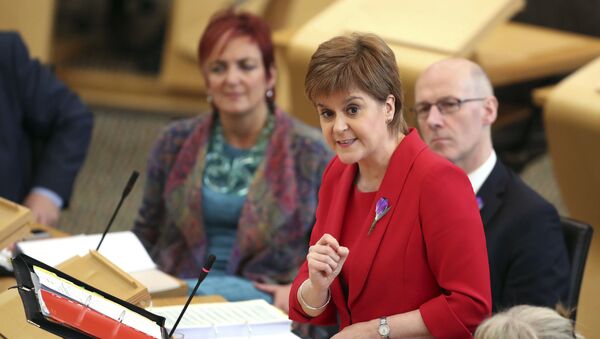Scottish First Minister Nicola Sturgeon has expressed surprise about the UK's unwillingness to define its relations with the EU a year and a half after the Brexit vote, the BBC reported.
"More than 18 months on from the Brexit vote, it beggars belief that the UK government is not only still unable to say what kind of relationship it wants with the EU, but has also failed to produce any meaningful economic assessment of the different possibilities," Sturgeon said.
She warned of "zero credible evidence" to confirm that Scotland will economically benefit from its leaving the single market.
"Indeed, as our analysis will show — the harder the Brexit the worse will be the outcome," Sturgeon pointed out.
Her remarks came ahead of the publication of the Scottish government's study about Brexit's impact on Scotland's economy. The study, titled "Scotland's Place in Europe: People, Jobs and Investment" is due to be released on Monday.
READ MORE: EU Expects 'Hard Brexit' as Talks Falter, Braces for Economic Downturn
While Sturgeon calls for Scotland remaining within the EU's single market and customs union, the UK government blames the Scottish National party for "trying to undermine the result of a democratic referendum," according to the BBC. While the majority of referendum voters in England and Wales voted for the UK to leave the EU, the majority of Scottish and Northern Irish voters were in favor of remaining within Europe.
Second Scottish Independence Referendum?
The BBC also cited Sturgeon as saying that she will decide on the possible holding of a second referendum on Scottish independence by the end of 2018, after a UK-EU deal takes more shape.
"By roundabout the autumn of this year we should have some clarity about that future relationship. That's when I will be able to look at that and make a judgment on what I think the next appropriate steps are for Scotland," she said.
An independence referendum in Scotland was held on September 18, 2014, when the No campaign secured about 55 percent of the vote.
Under the possible hard Brexit scenario, the UK may leave the EU without striking a trade deal with the bloc, potentially disrupting the economy.
READ MORE: 'Lost Decade': UK Has a Lot to Lose With 'Hard Brexit' — Report
The Brexit talks between the EU and the UK kicked off on June 19 and are due to wrap up by the end of March 2019, when Britain is scheduled to leave.
In December, the sides shifted to the second phase of the talks, which will focus on the transition period in EU-UK ties after Brexit.


